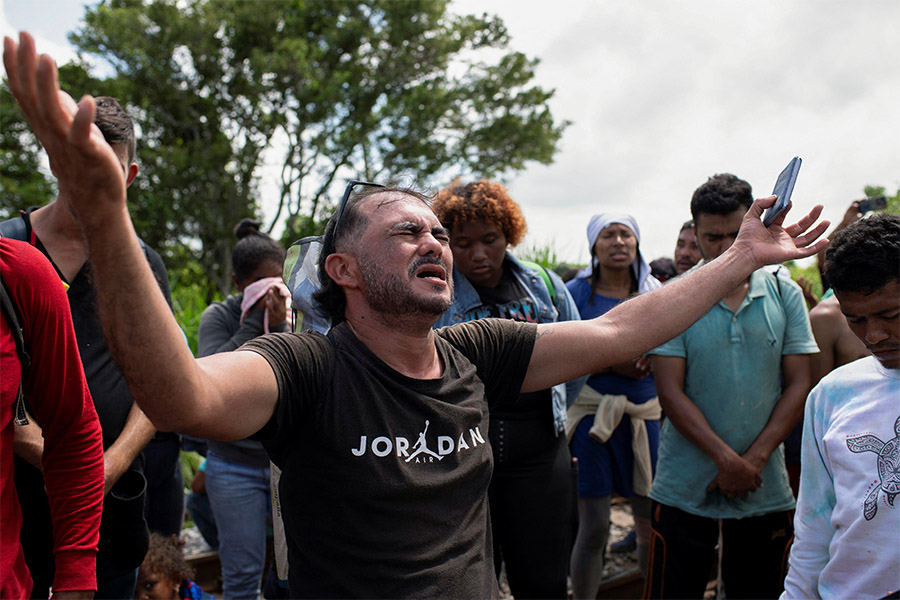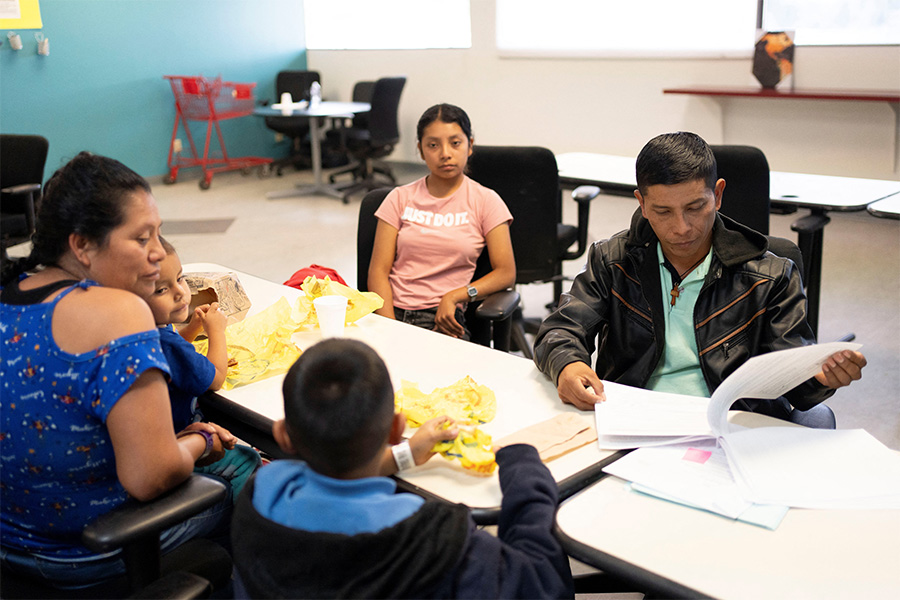Since President-elect Donald Trump’s victory on November 5, most Americans have expected him to address the issue of immigration within 100 days of reoccupying the Oval Office.
But immigrants who registered with the federal government – hoping to gain access to citizenship through programs such as Keeping Families Together (KFT), consideration for Deferred Action for Childhood Arrivals (DACA) and Temporary Protected Status (TPS) – will they really be the most numerous? vulnerable to eviction?
The answer may depend both on whether information provided to the Department of Homeland Security will be used for deportation purposes — and how quickly the Trump administration wants to deliver results on its commitment to deportation. mass expulsions.
Regarding migrant information to DHS, in the past, “there was a firewall between those who might have provided information because of a benefit they were seeking and that information being used for application,” explained J. Kevin Appleby. , senior director of international migration policy at the Center for Migration Studies in New York and former director of migration policy at the United States Conference of Catholic Bishops.
This time, he said, “all bets are off.” They will have access to this information and can therefore use it to track potential beneficiaries.
On November 7, U.S. District Judge J. Campbell Barker of the Eastern District of Texas struck down the KFT program – launched in June – on the grounds that the Biden administration had exceeded its authority. KFT allowed spouses and stepchildren of U.S. citizens, who did not have legal immigration status but had lived in the United States for 10 years or more, to apply for permanent residency without having to first leave the country .
Approximately 500,000 spouses of U.S. citizens and 50,000 noncitizen children under age 21 whose parent was married to a U.S. citizen were eligible for the program.
DACA allows approximately 535,000 young immigrants brought to the United States without authorization as children to seek temporary protection from deportation. The program, launched in 2012 under the Obama administration, also allows them to work legally. Trump tried to end DACA in 2017, but the Supreme Court upheld the program in 2020.
TPS is a program for people from countries experiencing internal disruption so extreme that their deportation would be considered dangerous, even life-threatening. TPS recipients have legal permission to work and remain in the United States while their home country maintains this designation. The program gained media attention this fall after false reports of immigrants eating pets in Springfield, Ohio, exploded on social media during the U.S. presidential campaign. However, there was underlying friction between some of the city’s indigenous residents and thousands of Haitian TPS recipients who legally lived and worked there.
Migrants with legal immigration status are not necessarily safe, Appleby said.
“It was essentially an executive authority that provided them with this legal status. So the new executive can revoke him,” Appleby said.
Both Trump and Vice President-elect JD Vance strongly suggested on the campaign trail that TPS, which currently protects 1 million people, would be reduced in their administration. Trump himself pledged in October to revoke TPS for Haitians living in Springfield who are credited with fueling the Rust Belt city’s economic revitalization.
Erin Corcoran, executive director of the Kroc Institute for International Peace Studies and professor at the Klau Institute for Civil and Human Rights at the University of Notre Dame, shared Appleby’s concerns about the plans to Trump’s mass expulsion of around 11 million people.
During his first term, President Trump deported 1.5 million people – a number matched by President Joe Biden in 2024 – compared to 4.8 million during President Barack Obama’s two terms, according to data collected by the Migration Policy Institute.
“If they want to do it very quickly — if they want to do it immediately — the people who will be most at risk,” Corcoran said, “are those who have already been in contact with authorities. People who don’t have real status – but have come into contact with DHS in some way – are, I think, at risk of deportation.

Which perhaps seems contradictory, Corcoran said.
“They’re kind of the nicest groups of people.” From a moral point of view, from a humanitarian point of view, these are people who actually did what they were supposed to do,” she said. “They came forward, they gave information; they are in the system.
And unlike most illegal immigrants, they are easily located by authorities.
“These people who signed up – the families – have names; they have addresses,” Corcoran said.
Trump’s new “border czar,” Tom Homan, who was nominated to the post on Nov. 10 and will not need Senate confirmation, has repeatedly addressed the issue of the effects of mass expulsions on families. Homan was Trump’s acting Immigration and Customs Enforcement director during the 2017-2018 “zero tolerance” era, in which children were taken from their parents amid illegal border crossings.
In response to the question of whether mass deportations can be carried out without separating families, Homan told CBS’s “60 Minutes” in October: “Of course yes, families can be deported together.” »
On December 26, Homan told several media outlets that the new Trump administration was considering open-air family detention centers to detain and deport families. He added that parents facing deportation will have to decide whether their U.S.-born children will accompany them or stay in the United States with a parent. He offered the following justification: “You knew you were in the country illegally and you chose to have a child. So you put your family in that position.
Pedro Alemán Perfecto, a policy advocate with the Catholic Legal Immigration Network Inc., also known as CLINIC, acknowledged Homan’s commitment to going after migrants more forcefully. But he kept a measured view, noting that migrant advocates have also prepared.
“This is not about panicking the community or individuals. We are cautious – but vigilant – about this,” he said. “This is what our community and vulnerable immigrant communities are feeling right now: wondering who can lead us; who can work with us. And it’s about what’s going to happen for them over the next four years.
Advocacy tactics, Alemán said, will likely need to be adapted.
“At CLINIC, we strive to get a lot of information out into the community, to combat misinformation and misinformation,” he said. “For us, it’s about doing our research; make our case; knowing who we can trust with different partners – then reaching out to those affected on the ground.
The destination of the mass deportees also remains an open question. They may not even end up in their country of origin.
NBC News reported on December 5 that the new Trump administration was drawing up a list of potential countries to send migrants to if their home country refused to accept them. The Bahamas said it “reviewed and strongly rejected” Trump’s plan, while NBC’s sources said other countries under consideration include the Turks and Caicos Islands, Panama and Grenada.
In an interview on NBC’s “Meet the Press” that aired Dec. 8, Trump echoed many of Homan’s comments, emphasizing that his deportation program would focus on people with criminal histories — while vaguely referring to ” other people besides criminals.”
He also reiterated his commitment to ending citizenship rights, while saying he was open to working with Democrats to develop a plan for “Dreamers,” or DACA recipients.
At the U.S. bishops’ general assembly in November, Bishop Mark J. Seitz of El Paso, Texas, chairman of the bishop’s committee on migration, said the bishops were “waiting to see exactly what takes shape.” . But he promised they would “raise their voices loud and clear” if Trump’s rhetoric on deportation becomes a reality.
Reports indicate that not only will the new Trump administration’s mass expulsion policy be ready to launch on day one, but that it will apply full force to the life of the Church.
On December 11, NBC News reported that the new Trump administration planned to repeal a long-standing “sensitive locations” policy previously prohibiting the arrest of illegal immigrants – except in certain circumstances – at churches, schools and hospitals.
Appleby said U.S. bishops face a critical moment that “will test the resolve of the Church.” While statements of solidarity are helpful, Appleby said direct action plans — including direct support and legal assistance to immigrant families — are needed.
“If Trump fully implements this,” Appleby predicted, “it will impact the life of the Church.” You’re going to have ICE agents outside the door of the mass. You will certainly see some immigrants seeking refuge in their parishes. And this will put the bishops in a difficult position vis-à-vis the government.”
“We have a pope who is a strong advocate for migrants,” Appleby said. “And I hope that the American Church will reflect that in its response to this mass expulsion plan. »
What does the Church teach about immigration and deportation?
The Catechism of the Catholic Church teaches: “The most prosperous nations are obliged, to the extent of their possibilities, to welcome the foreigner in search of security and means of subsistence which he cannot find in his own country. ‘origin. »
At the same time, the Church has also made clear that human laws are also subject to divine limits. Saint John Paul II’s 1993 encyclical “Veritatis Splendor” (“Splendor of the Truth”) and the 1995 encyclical “Evangelium Vitae” (“The Gospel of Life”) both cite the teaching of the Second Vatican Council in “Gaudium et Spes”, the Pastoral Constitution. on the Church in the modern world, which qualifies among various specific acts the “deportation” as “offensive to human dignity” which “are a shame, and as long as they infect human civilization, they further contaminate those who inflict only on those who suffer injustice, and they are a negation of the honor due to the Creator.
The late pontiff highlighted their moral severity in “Veritatis Splendor” as examples of “intrinsic evil,” explaining that, whatever the motives, these acts “cannot be ordered to God and the good of the person “.
Read more Immigration and migration
Copyright © 2025 OSV News
![]() Print
Print
catholicreview


